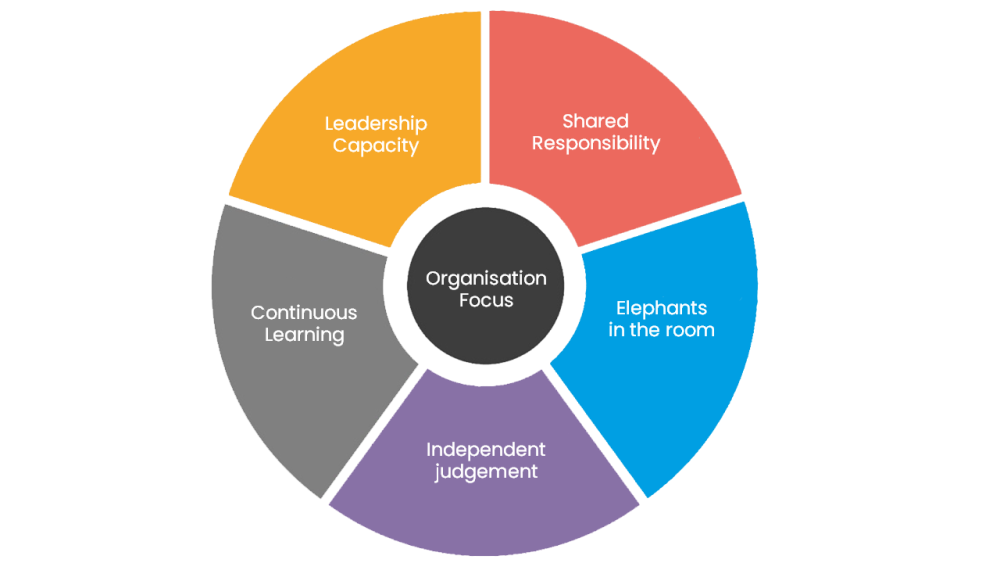Adaptive Leadership
Adaptive leadership is the leadership style in organisations which is required to enhance the opportunity for everyone to perform at their peak. The principle on which Adaptive Leadership is based is:
‘Sharing Responsibility for the Future Success of the Organisation
amongst everyone in the organisation’
This means that ‘everyone takes a lead’, to ensure that tomorrow is going to be more successful than today.
In case you think this leads to anarchy, it is necessary to draw a distinction between accountability and responsibility.
Accountability and responsibility
People who hold ‘authoritative positions’ in organisations are the people who are held to account by third parties for the successful delivery of their part of the business or service. They are accountable for their part of the whole organisation. People who feel responsible or responsibility feel a ‘duty’ to undertake tasks because there is good reason for doing so. The stronger the sense of ‘duty’ the stronger the feeling of responsibility.
Therefore, under Adaptive Leadership principles, the workforce is expected to feel responsibility for the future success of the business without being held to account by a third party.
The way this works is that each employee is encouraged to feel they are responsible for helping the person in the authoritative position be held to account.
For this to happen, each employee is encouraged by their authoritative leader to focus on the success of the organisation and NOT the success of the leader, even though each is helping the authoritative leader to be held to account.
By focusing on the needs of the organisation, adaptive leaders are thinking for themselves about any matters that may help the organisation to become more successful tomorrow compared with today. They are not inhibited in any way by thinking about the fortunes of their authoritative leaders; they are solely concerned about the success of the business.
Therefore, each employee is expected to be open about any observations, critiques, ideas, innovations that may occur and not to keep such observations to themselves, as this potentially deprives the organisation from benefitting from the observations.
The rationale is that the combined intelligence of the workforce is far greater and more broadly based than it authoritative leaders and managers, and, therefore, it is crazy not to ensure that the intelligence is encouraged to make its contribution to the success of the business.
Eliminate fear
As fear is endemic to organisations, another benefit of adaptive leadership is to eliminate fear. This is done by ensuring everyone is expected to contribute to the future success of the business by being open in their observations and critiques. Such observations and critiques are possible only if individuals feel psychologically safe, i.e. there is no threat to individual self-esteem.
Of course, for each employee to feel they can make a valuable contribution they have to know how the organisation works. Job shadowing is part of the process. Not only does this enable people to understand other people’s work, it helps enormously in communication. It is well established that when people know the person at the other end of the email, they interact in ways that facilitate successful communication between them, assuming they like each other!
As part of the process of changing the mindset of authoritative leaders, the exercise of ‘elephants in the room’ is played endlessly. This exercise requires people to think hard about themselves and whether they are the inhibitors to openness. The exercise helps people change their approach to being a manager, and can help develop individuals as leaders, with the requisite skills in interaction.
Everyone is routinely encouraged to review what has taken place throughout the working day. Lesson are learnt and applied. The attitude is that ‘all failures are successes waiting to happen’ and there is ‘no blame, only understanding’.
Key Features of Adaptive Leadership
Adaptive Leadership Questionnaire
This mini Questionnaire will help you discover aspects of your organisation and its management processes that are directly linked to Adaptive Leadership principles and help you highlight specific items that may be inhibiting its application.
To experience the flavour of what is involved in Adaptive leadership, answer the following questions with a yes or no.
| To what extent does your organisation | Yes or No | |
|
1 |
Encourage the unsolicited sharing of resources |
|
|
2 |
Encourage the giving of rewards to the whole workforce for corporate success |
|
|
3 |
Encourage the sharing of unsolicited ideas across the organisation |
|
|
4 |
Encourage job shadowing across the organisation |
|
|
5 |
Encourage critical appraisal of one part of the organisation by a different part of the organisation |
|
|
6 |
Encourage understanding amongst the workforce of all parts of the organisation and how they work |
|
|
7 |
Encourage the discussion and resolution of ‘Elephants in the Room’ |
|
|
8 |
Create an atmosphere where critical appraisal is normal behaviour |
|
|
9 |
Invite, from the workforce, observations, questions, and ideas, and respond positively to them |
|
|
10 |
Has in mind the success of the organisation and not the reputation of individuals |
|
When considering the term ‘organisation’ you may apply this to the whole organisation or parts of it, your own department or your own team.
You may find it helpful to use the questionnaire in making an assessment of different parts of the organisation, as well as the whole, so you can identify those parts of the organisation that might be an example to be followed when applying Adaptive Leadership principles into the organisation as a whole.

This article and accompanying tips have been provided for FICM by leading psychologist Dr Derek Mowbray.
To find out more about Strengthening Organisational Resilience, read Derek ’s Guide to Organisational Resilience.
To find out more about in house programmes for Organisational Resilience, email barbara.leigh@mas.org.uk, or download a pdf of all our development programmes.
More information can be found in the MAS Article Library, or why not try the MAS Questionnaires.
Want to know more?
Browse our Wellbeing resources.


